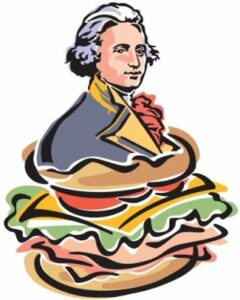Eponyms
An eponym is a word based on a person, real or imaginary, from whom something takes its name. You will encounter several types of eponyms. These include historical and geographical eponyms, literary eponyms, mythological eponyms, and scientific eponyms.
Here are some eponyms you might have come across, but whose origins you may not know.
 sandwich – two or more slices of bread with a layer of meat, fish, cheese, etc., between each slice. It was named after John Montague, the fourth Earl of Sandwich, who invented it so he could continue gambling without stopping for a regular meal.
sandwich – two or more slices of bread with a layer of meat, fish, cheese, etc., between each slice. It was named after John Montague, the fourth Earl of Sandwich, who invented it so he could continue gambling without stopping for a regular meal.
cardigan – a usually collarless knitted sweater or jacket that opens down the front. It was named after the Earl of Cardigan, a British officer whose soldiers wore this type of sweater during the Crimean War.
martinet – a strict disciplinarian, especially a military one. It was named after Jean Martinet, a very harsh French army drill master.
nicotine – a highly toxic alkaloid found in tobacco. It was named after Jean Nicot, a French diplomat who introduced the tobacco plant to France about 1561.
braille – a system of writing or printing used by the blind. It was named after Louis Braille, a French teacher of the blind.
pasteurize – a process of exposing a food such as milk to a high temperature over a period of time to destroy microorganisms that can produce disease or cause spoilage. It was named after Louis Pasteur, a French bacteriologist, who discovered that heating milk killed germs.
saxophone – a musical wind instrument. It was named after Anton Sax, a Belgian instrument maker who combined a clarinet’s reed with oboe fingering.
mesmerize – to hypnotize or spellbind. It was named after Frederich Mesmer, an Austrian physician who practiced hypnotism.
shrapnel – metal fragments resulting from an exploded shell. It was named after Henry Shrapnel, an English artillery officer.
dunce – a dull-witted, stupid, or ignorant person. It was named after Johannes Duns Scotus, a theologian whose followers were thought to be wrong or stupid.
sideburns – short whiskers extending from the hairline to below the ears. It was named after Ambrose Burnside, a Civil War general who had thick side whiskers.
chauvinist – a person who is extremely devoted to his or her country. It was named after Nicholas Chauvin, a soldier who worshipped France and Napoleon uncritically.
macadam – a road-building material composed of gravel and tar. It was named after John McAdam, a Scottish engineer who invented this material.
guillotine – a device for beheading a person widely used during the French Revolution. It was named after Joseph Guillotin, a French physician.
spoonerism – the accidental transposition of initial sounds of words. For example, saying “keys and parrots” when meaning to say “peas and carrots.” It was named after William Spooner, an English clergyman who often made such slips in his sermons.
mackintosh – a waterproof raincoat made of rubberized cloth. It was named after Charles MacIntosh, a Scottish chemist who invented this material.
malapropism – the mistaken use of a word in place of a similar-sounding one, usually with an unintentional, amusing effect. For example, saying “A rolling stone gathers no moths,” instead of saying “moss”. It was named after Mrs. Malaprop, a character in Sheridan’s play “The Rivals,” who frequently made this type of error.
gerrymander – the act of dividing an election district so that one political party would have a majority. It was named after Elbridge Gerry, a governor of Massachusetts who redrew election districts to favor his party.
You will find many more eponyms. Knowing how they derived will help you expand your vocabulary.
